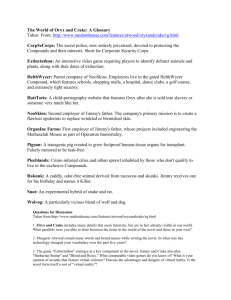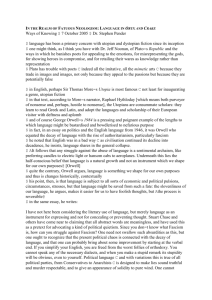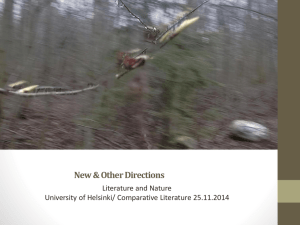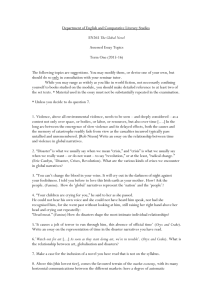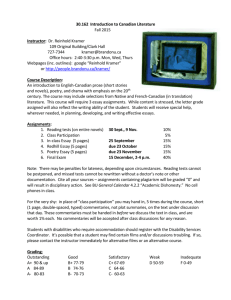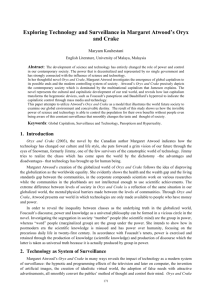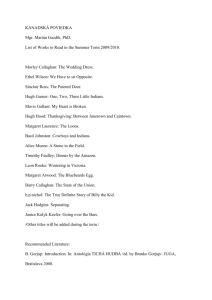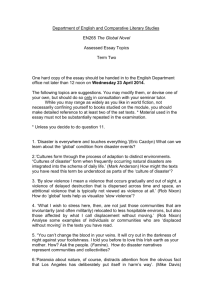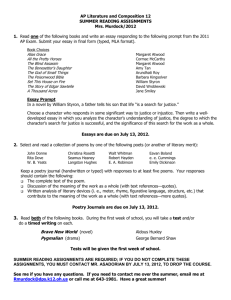Genetic Games of a Retiring God: Atwood's “Divine Solution” in Oryx
advertisement
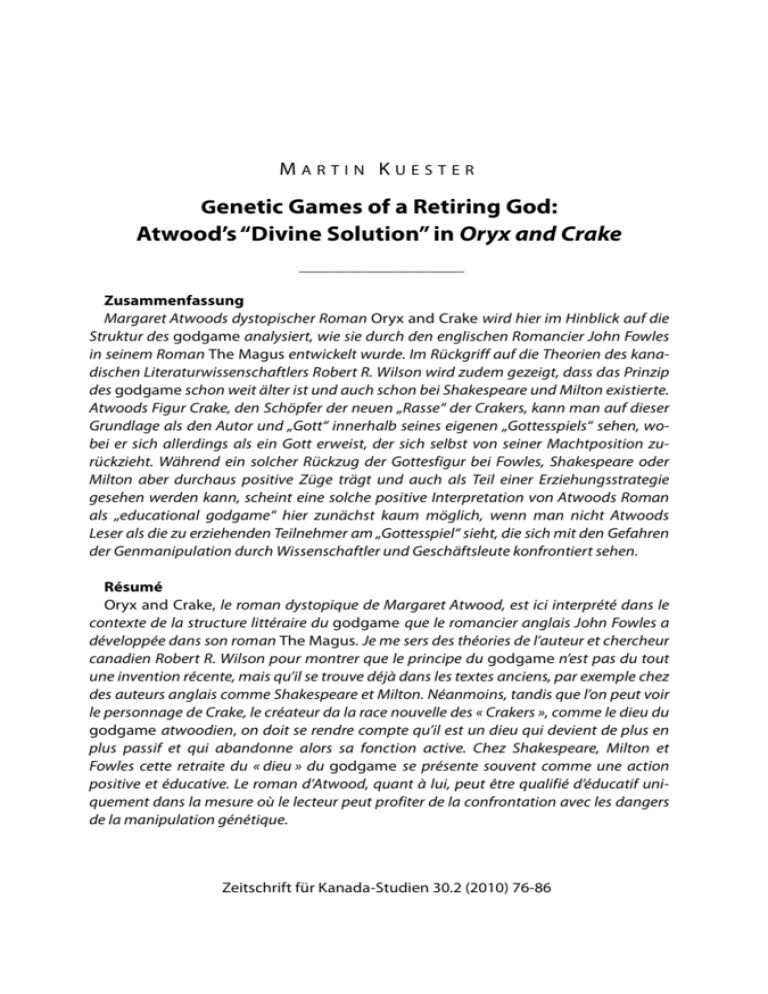
MARTIN KUESTER Genetic Games of a Retiring God: Atwood’s “Divine Solution” in Oryx and Crake _____________________ Zusammenfassung Margaret Atwoods dystopischer Roman Oryx and Crake wird hier im Hinblick auf die Struktur des godgame analysiert, wie sie durch den englischen Romancier John Fowles in seinem Roman The Magus entwickelt wurde. Im Rückgriff auf die Theorien des kanadischen Literaturwissenschaftlers Robert R. Wilson wird zudem gezeigt, dass das Prinzip des godgame schon weit älter ist und auch schon bei Shakespeare und Milton existierte. Atwoods Figur Crake, den Schöpfer der neuen „Rasse“ der Crakers, kann man auf dieser Grundlage als den Autor und „Gott“ innerhalb seines eigenen „Gottesspiels“ sehen, wobei er sich allerdings als ein Gott erweist, der sich selbst von seiner Machtposition zurückzieht. Während ein solcher Rückzug der Gottesfigur bei Fowles, Shakespeare oder Milton aber durchaus positive Züge trägt und auch als Teil einer Erziehungsstrategie gesehen werden kann, scheint eine solche positive Interpretation von Atwoods Roman als „educational godgame“ hier zunächst kaum möglich, wenn man nicht Atwoods Leser als die zu erziehenden Teilnehmer am „Gottesspiel“ sieht, die sich mit den Gefahren der Genmanipulation durch Wissenschaftler und Geschäftsleute konfrontiert sehen. Résumé Oryx and Crake, le roman dystopique de Margaret Atwood, est ici interprété dans le contexte de la structure littéraire du godgame que le romancier anglais John Fowles a développée dans son roman The Magus. Je me sers des théories de l’auteur et chercheur canadien Robert R. Wilson pour montrer que le principe du godgame n’est pas du tout une invention récente, mais qu’il se trouve déjà dans les textes anciens, par exemple chez des auteurs anglais comme Shakespeare et Milton. Néanmoins, tandis que l’on peut voir le personnage de Crake, le créateur da la race nouvelle des « Crakers », comme le dieu du godgame atwoodien, on doit se rendre compte qu’il est un dieu qui devient de plus en plus passif et qui abandonne alors sa fonction active. Chez Shakespeare, Milton et Fowles cette retraite du « dieu » du godgame se présente souvent comme une action positive et éducative. Le roman d’Atwood, quant à lui, peut être qualifié d’éducatif uniquement dans la mesure où le lecteur peut profiter de la confrontation avec les dangers de la manipulation génétique. Zeitschrift für Kanada-Studien 30.2 (2010) 76-86 Atwood’s “Divine Solution” in Oryx and Crake 77 Margaret Atwood’s dystopian science fiction novel – or rather “speculative fiction” (Atwood 2005, 322) – Oryx and Crake presents an appalling vision of the future of our environment. Atwood is, in J. Brooks Bouson’s words, “intent on showing the calamitous impact that scientific knowledge, if misused, can have on the human realm” (Bouson 2004, 140). In Oryx and Crake, Atwood describes the probable extinction of all humans as we know them and their being replaced with physically very well-adapted (but intellectually streamlined and – by our standards – more than challenged) Crakers. Such a scenario can hardly be seen as the “survival” of humankind anymore; it certainly would not represent Atwood’s (in)famous victim position number four from her study Survival that had posited the ideal of being “a creative non-victim” (on Atwood’s environmentalism, see Rubenstein 1988; Hengen 2006). As far as generic classification goes, the novel has been interpreted in various ways: as last-man-on-earth novel (Korte 2008), castaway-survivor narrative (Howells 2006, 170), detective and action thriller, Swiftian satire (Dvorak 2006), adventure romance (Staines 2006, 24) or even as a “version of Milton’s Paradise Lost for a postmodern secular world” (Howells 2006, 173). What I would like to show in this paper is that Atwood also makes use of a time-honoured plot structure or “narrative category” (Wilson 1990, 123-124) that the recently deceased British novelist John Fowles once referred to as a “godgame.” The transhistorical importance of the godgame – reaching back to Milton and Shakespeare and even further – has been exposited by the Canadian writer and scholar Robert Rawdon Wilson in several essays that were later integrated into his volume In Palamedes’ Shadow: Explorations in Play, Game, and Narrative Theory. Atwood’s novel takes into account the sorry state of the polluted North American environment that will endanger the survival of mankind, and even of the genetically manipulated Crakers, but my reading of Oryx and Crake is not primarily an ecologically minded one, although I will insist that the novel carries an ecological message in the end. Following J. Brooks Bouson’s impression that Oryx and Crake is “a complex, and game-like, multi-layered narrative” (Bouson 2004, 141) and taking some cues from Stephen Dunning’s reading of the characters Crake, Jimmy and Oryx as a version of “the Christian Trinity whose authority science has effectively displaced” (Dunning 2005, 95),1 I suggest another reading of the novel, which may seem unusual at first sight, but which is encouraged by textual evidence. 1 The idea of Crake, Jimmy/Snowman and Oryx being a parodic version of the Christian trinity is fascinating, although probably the parallels between the trinity and the characters can hardly be followed through to the very end. Dunning claims that “Crake assumes the role of the Father, creator of all, triumphant over chaos; Snowman, that of sacrificial Son and immanent Logos (and perhaps also of Gnostic Logos marooned in matter); and Oryx, that of Spirit, omnipresent, ‘feminine’ Paraclete.” I would have my doubts, though, about this version of the Holy Spirit, as one may well see Oryx as mostly a projection of Crake’s and Jimmy’s sexual desires rather than a spirit or muse. While Dunning admits that she is enigmatic and “emerges as the oppressed, exploited ‘Other,’” he also sees her, and there I would part ways with him, “incarnating possibilities of communion and love that neither Snowman nor Crake can fully grasp” (Dunning 2005, 89). 78 Martin Kuester As games play a central role in the novel – the two main male characters having for many years indulged in various kinds of video and internet games – it seems more than justifiable to look for games as underlying metaphors or structural models in the plot. In this context, the game structure that the novelist John Fowles has called “godgame” provides a central and innovative approach to the novel. Godgames The term godgame appears regularly today in the context of computer games and in science fiction and fantasy literature. As John Clute writes in the Encyclopedia of Fantasy, a considerable proportion of FANTASY narratives can be described as tales whose protagonists search – almost always successfully – for the underlying STORY which explains their nature and their world, a Story whose natural outcome is a structurally complete – and therefore allencompassing – ending. (Clute 1999, 414) To underscore this impression, a simple search using amazon.com’s “look inside!” function for the Encyclopedia of Fantasy, provides fifty hits, proving the godgame to be a fairly popular concept in this genre. Theoretical work on the concept of the godgame can be traced back to the English novelist John Fowles. As Fowles writes in the 1976 foreword to the revised edition of his novel The Magus, the first version of which had appeared in 1965, an alternative title for the book had been The Godgame. In this novel, the protagonist, Nicholas Urfe, an English teacher who works in a boarding school on a Greek island, feels as if caught in a plot conceived (or a drama scripted) by the mysterious Mr. Conchis, whom Fowles intended “to exhibit a series of masks representing human notions of God, from the supernatural to the jargon-ridden scientific” (Fowles 1985, 10). This godlike character owns large parts of the Greek island where the young Englishman has been hired as a teacher. Conchis – and the pun on ‘conscious’ included in his name is intentional – thus becomes the director or master of the drama that one might also call a godgame: He becomes the magus we know from the title that Fowles finally chose for the novel. At the end of this godgame, which includes not only sexual temptation but also several challenging stages of psychologically harrowing trials (which are later claimed to have been brought on for trial only), Nicholas, the unfaithful hedonist, who at first is not at all unattracted by the charms of the nubile women with whom he is confronted on the island, seems to have a chance of being reunited with his old girlfriend Alison in Britain. He has grown into a sadder, wiser and more responsible man. While Fowles in the end decided against the title The Godgame for the novel and rather went for The Magus, thus focusing on the figure of the master of this game, his collection of philosophical essays, The Aristos, which was written at about the Atwood’s “Divine Solution” in Oryx and Crake 79 same time as The Magus, already has a section entitled “The Godgame.” In this section, Fowles describes the godgame as the “divine solution” for a political leader: It is a way for a ruling politician “to govern by not governing in any sense that the governed can call being governed; that is, constitute a situation in which the governed must govern themselves” (Fowles 1981, 18). Such a definition might well alienate contemporary readers somewhat, as government is here after all seen as a kind of manipulation. This may not be so surprising in an age in which leading politicians and political advisers have come to be referred to as “spin doctors,” but Fowles, who derives his distinction between the aristoi (the good ones) and the common people (the hoi polloi) from the pre-Socratic Greek philosopher Heraclitus, denies being a “crypto-fascist”. Rather, he claims, “All my adult life I have believed that the only rational political doctrine one can hold is democratic socialism” (Fowles 1981, 9). Godgames can be more or less harmless games that powerful and tendentiously manipulative rulers play with their subjects in order to live out their sadistic urges, but they can also be used for educational purposes, as a form of role play, in which the students are, however, not aware of the educational situation in which they have been placed. For example, Fowles himself states in an interview with Katherine Tarbox that The basic idea that lay behind The Magus was that we are all in fact in a godgame and we’re always in close contact with a kind of superConchis. This is the very basis of human existence, for me. There are mysteries, there are weird lessons being taught us by ordinary life itself. (Fowles, qtd. in Tarbox 1999, 160) Furthermore, Fowles himself refers to the act, and even temptation, of writing novels as a godgame: “There is a vanity about it, a wish to play the godgame, which all the random and author-removing devices of avant-garde technique cannot hide” (Fowles 1999, 23).2 The Canadian writer and scholar R. Rawdon Wilson has published several essays on godgames and includes a chapter on this kind of game in his book on plays, games and narrative theory. He defines the godgame in the following way: A godgame signifies a gamelike situation in which a magister ludi knows the rules (because he has invented them) and the character-player does 2 Godgames would then also be the counterpart of the secular scripture of romance that Northrop Frye describes in The Secular Scripture: “The secular scripture tells us that we are the creators; other scriptures tell us that we are actors in a drama of divine creation and redemption…. Identity and self-recognition begin when we realize that this is not an either-or question, when the great twins of divine creation and human recreation have merged into one, and we can see that the same shape is upon both” (Frye 1976, 157). Interestingly enough, Andrew M. Greeley chose these very Frygian lines as an epigraph for his science fiction novel God Game (1986). 80 Martin Kuester not. A godgame occurs in literature when one or more characters creates [sic] an illusion, a mazelike sequence of false accounts, that entraps other characters. The entrapped character becomes entangled in the threads of (from his point of view) an incomprehensible strategy plotted by another character who displays the roles of both a gamewright and a god. The master of the game is godlike in that he exercises power, holds an advantageous position, will probably be beyond detection (even understanding), and may even be, like Oberon or Ariel in Shakespeare’s plays, invisible. (Wilson 1990, 123-124) Briefly put, “In a godgame, one character (or several) is made a victim by another character’s superior knowledge and power. Caught in a cunningly constructed web of appearances, the victim, who finds the illusion to be impenetrable, is observed and his behaviour is judged” (Wilson 1990, 123). Such godgame situations are nowadays known to most of us through contemporary movies such as The Game (1997), directed by David Fincher and starring Michael Douglas,3 or Peter Weir’s The Truman Show (1998), starring Jim Carrey. The term godgame is also often used today in the virtual realm of video, computer or internet games, but the term seems to be used here somewhat differently from the way established in literary criticism. Still, some specialists see Fowles’s The Magus as a forerunner of new “alternate reality games” (see Martin/Chatfield/Alexander 2006). Far from being tied to our contemporary society with its computer games or to the virtual worlds of the World Wide Web, the godgame, as Wilson points out, is “a category that has existed since the tales of ancient mythology” (Wilson 1990, 123). Godgame situations in English literature, Wilson has shown, date back to at least early modern literature. Examples of it can be found in Shakespeare’s Measure for Measure and The Tempest, for example, in which rulers such as Duke Vincentio in Vienna – or Prospero, the former Duke of Milan, on his island – set the stage for the coming action as if they were the directors of stage plays. Richard Fly, for example, calls Vincentio an “obvious surrogate playwright” (Fly 1976, xiv), whereas others have interpreted his role as that of a seventeenth-century politician if not the “Incarnate Lord” (Lever 1979, lvii). Anthony Miller interprets Prospero’s actions as “a range of educative or coercive attempts to fashion worthy magistrates, and idealistic discourses on perfect commonwealths” (Miller 2001, 211). Often these rulers then withdraw (or at least disguise, as in Vincentio’s case) in order to observe the behaviour of those left behind. Perhaps not unfittingly, it has even been claimed that there is a godgame structure in Milton’s masque Comus, where the Attendant Spirit withdraws for a time in order to let the young lady and her brothers deal with the evil spirit Comus on their own. 3 For the similarities between the film and John Fowles’s The Magus, see Goosmann 2007. Atwood’s “Divine Solution” in Oryx and Crake 81 It has even been claimed that an epic such as Paradise Lost may contain a godgame, when the Father makes Adam and Eve undergo a process of education through the archangel Raphael. The negative outcome of this educational attempt, which nevertheless serves to make Adam and Eve alone responsible for their Fall, as they had been forewarned and thus been able to rely on their own free will, is known to the Father already, while he observes them. In this sense, then, too, the paradise lost in Milton’s epic is an earlier type of Atwood’s dystopian “Paradice” spelled with a c that is lost in Oryx and Crake.4 Retraction Godgames can have several kinds of purpose. They may be nothing but games that powerful masters allow themselves to play with their underlings in order to express and enjoy their sheer power, but they may also have educational purposes as is arguably the case, for example, in Shakespeare’s Measure for Measure and The Tempest. The withdrawal of the magister ludi may be temporary or pretended only, as Duke Vincentio’s in Measure for Measure, but it also may be a governor’s withdrawal from power for good, making room for the now duly educated (and tested) “young” generation. Prospero, for example, in the last lines of The Tempest sets Ariel free and in his famous epilogue proclaims that Now my charms are all o’erthrown, And what strength I have’s mine own, Which is most faint. … (The Tempest, epilogue, ll. 1-3) Following Alan C. Dessen, who sees Prospero vacillating between the positions of “the potent magus” and “the lapsed magician” (Dessen 1995, 215), the Arden edition of The Tempest offers the possible interpretation of Prospero’s departure as “the magus’s loss and new-found vulnerability” (note to 5.1.319, p. 285). Especially interesting is the type of godgame in which the god figure playing games with human beings finally leaves the stage for good and withdraws. Wilson claims that “one striking difference between baroque and modern godgames lies in the withdrawn, hidden (or disappearing) nature of the god in the latter” (Wilson 1990, 131). I agree with his emphasis on the importance of disappearing gods in contemporary godgames, but ideas of such a retraction of a magus figure, the ultimate case of what I would call an educational godgame, have also existed for a long time. One example, in Milton criticism, is grounded in part on the famous line from Paradise Lost, in which the Father proclaims: “Though I uncircumscrib’d myself retire, / And put not forth my goodness, which is free / To act or act not …” (bk. 7, ll. 170- 4 For these Miltonic parallels, see Kuester 1997 and 2003. For the allusion in the “new” spelling of “Paradice” – splicing together “paradise” and the “pair of dice” that symbolize the role of chance, see below. 82 Martin Kuester 172). Heretical Milton critics such as Denis Saurat and William Empson have claimed for almost a century that there is an act of God’s “retraction” or even “abdication” in Paradise Lost. For Empson, God’s abdication even remains the only feature making “the whole picture of him just tolerable” (Empson 1981, 130). John Fowles supports such an interpretation in The Aristos, although he does not mention Paradise Lost expressis verbis: “If there had been a creator, his second act would have been to disappear” (Fowles 1981, 18). Games and Gods in Oryx and Crake Godgames are also, as Wilson notes, “frequent in science fiction and generally in fantasy” (Wilson 1990, 129). In the not so distant twenty-first century world of Oryx and Crake, games have become an important part not only of leisure time activities but also of science, for example in the field of genetic experimentation. Crake claims that compounds such as HelthWyzer “put the hostile bioforms into their vitamin pills” (Atwood 2003, 211), so that one may argue that even in the business sector a sort of game, perhaps even a godgame, is played by the pharmaceutical industry with unsuspecting consumers in the pleeblands. Stephen Dunning, who sees Crake, Oryx and Jimmy as a new and parodic incarnation of the Christian trinity, interprets successful scientists, of whom Crake is one of the most ingenious, as the typical Cartesian researchers whose work means to close the last gaps that had still existed in a comprehensive twentieth-century scientific explanation of the world. These gaps have been used to justify one modern concept of godhead: that of the “God of the gaps” who is dying “a death by inches” (Dunning 2005, 88) as scientists explain away those perhaps ever diminishing aspects of the universe which their theories cannot yet account for. The success of these genetic games almost inevitably leads to a feeling of hubris so that scientists like Crake either “feel like God” (51) or even think that they have “eliminated what he called the G-spot in the brain” (157) of their genetically improved creatures so that there is no more need for the concept of godhead in this brave new world. Unfortunately, though, something seems to have gone wrong, as not all religious atavisms have been erased among Crake’s creatures: The Crakers still feel an inner need for religious master narratives and so feel compelled to ask who made them (311), so that Jimmy in his reincarnation as Snowman has to invent a new religious narrative, which he potters together in the rather unplanned and contradictory manner of a Lévi-Straussean bricoleur. Furthermore, the Crakers intuitively follow the model of the Israelites in the desert of Sinai, who created a visible figure of God for themselves when Moses had left them for a time. At least, the Crakers’ behaviour, the need they feel for “symbolic thinking” (361), can be interpreted as an innate need for a visible presence of the divine in their lives. The Crakers, whose G-spot does not seem to have been eradicated as completely as Crake had intended, form a semi-circle around a statue, “a grotesque-looking figure, a scare- Atwood’s “Divine Solution” in Oryx and Crake 83 crowlike effigy” (360), which they address as Snowman. As one of the Crakers explains, “We made a picture of you, to help us send out our voices to you” (361). Crake is an avid player of games who is obsessed with gaining control over any game situation (writing God – or chance – out of the game plan), whether it be in playing Extinctathon with Jimmy or in genetically creating his own race of ecologyfriendly subhumans. All the games he plays “used parallel strategies: you had to see where you were headed before you got there, but also where the other guy was headed. Crake was good at those games because he was a master of the sideways leap” (40). As he once puts it, “The real set is in your head,” and he “would get fixated on a game, and would want to play it and play it and perfect his attack until he was sure he could win, nine times out of ten anyway” (77). We see that he strategically planned the creation of the new race of Crakers to whom – through the effect of the BlyssPluss pill – he is going to leave a world free of the old kind of humans that had proved to be deficient. This radical purgation of the world from all humans even includes himself, as he seems to have staged his own murder by Jimmy. Thus only Jimmy, who is highly unlikely to survive for very long in the post-apocalyptic world, is left behind to steer the Crakers into a new world. Now the godgame that Crake plays is a special one. As shown above, in a “normal” godgame, the god generally withdraws for a time, observes the others and then comes back to judge them. This is the case, for example, in Shakespeare’s Measure for Measure, where the “fantastical duke of dark corners” returns in the end to judge his deputy. In the novel’s universe, most characters, such as for example Jimmy’s mother, think that Crake “is intellectually honourable” and “doesn’t lie to himself” (69), but Crake is not a figure of authority who withdraws from the world in order to observe the others. Jimmy himself, for example, “knew a bit more about Crake than his mother did” (70). Crake’s withdrawal is not a temporal one, either, but rather final: He kills Oryx and then provokes his own murder by the hand of Jimmy. Jimmy argues that Crake had planned to be killed, and there are several hints within the novel supporting such a view, as for example Crake’s interest in assisted-suicide sites on the web: “[Jimmy] couldn’t imagine doing such a thing himself, unlike Crake, who said it showed flair to know when you’d had enough” (84). Crake seems to think that his creation, the Crakers, will live on forever (or perhaps even that he will live on through his creation): When Jimmy claims that human beings are doomed without hope, Crake cheerfully retorts: “Only as individuals” (120). But after his retraction, which Bouson qualifies as a “hubristic genocidal endgame” (Bouson 142), the world turns into “one vast uncontrolled experiment – the way it always was, Crake would have said – and the doctrine of unintended consequences is in full spate” (228). In the typology of godgames, the one I have called educational is one of the most interesting. While one might often see the behaviour of a ruler or director withdrawing from the field of action for a time in order to observe and then later judge the shortcomings of his subjects as a less than humane way of treating others, Mr. Con- 84 Martin Kuester chis in John Fowles’s The Magus claims to be a teacher. A similar point has been made for Paradise Lost as an educational godgame, in which Adam and Eve are prepared for a postlapsarian life outside the Garden of Eden. Can one also see the elitist scientific snob Crake in such a “teacherly” perspective? According to Brian Bethune, Atwood admits that “‘From a certain perspective […] Crake is the most altruistic person around’” (qtd. in Bethune 2003, n.p.) and Stephen Dunning is willing to grant that Crake “clearly acts with therapeutic intent” (Dunning 2005, 89), but Jimmy, for one, does not really think so. He sees Crake as a godlike figure “sitting in judgment on the world,” but he wonders: “Why had that been his right?” (341). And, “had he been a lunatic or an intellectually honourable man who’d thought things through to their logical conclusion? And was there any difference?” (343). In the traditional “educational” godgame of Milton’s Paradise Lost, the characters undergoing the godgame would be able to exist on their own, ideally having the world standing open before them (and perhaps even God’s providence accompanying them): The World was all before them, where to choose Thir place of rest, and Providence thir guide: They hand in hand with wand’ring steps and slow, Through Eden took thir solitary way. (bk. 12, ll. 646-649) But are the Crakers able to act in their new world as Adam and Eve were in ours? Can they profit from providence and/or human intelligence? In order to guarantee this, Jimmy/Snowman, who is an altogether inefficient representative of providence, has to turn into “A cross between pedagogue, soothsayer, and benevolent uncle” (7). Crake had prepared him mentally for such a possibility, it seems. He wanted him to look after the Paradice Project, and he had even asked him if he felt able to kill someone he loved to spare them pain (320), but the impact of Crake’s hints only dawns upon Jimmy when he is on his own with the Crakers in a deserted and destroyed world: “How could I have missed it? Snowman thinks. What he was telling me. How could I have been so stupid” (184). He certainly lacks any idea of an educational master plan, as the stumbling and contradictory narratives he tells the Crakers show. Coral Ann Howells claims that “through storytelling he teaches the Crakers the rudiments of symbolic thinking” (Howells 2006, 171), but his stories do not fit together and remind us of the myths glued together by a Lévi-Straussean bricoleur rather than the well laid-out master plan that a master gamester such as Crake would have developed. Even the naming and spelling of Atwood’s Paradice, with its allusion to the game situation represented by a pair of dice, is another link – intentional or not – to Fowles’s game plan of the “divine solution”: In The Aristos, the definition of the “divine solution” and the reference to a creator whose second act would have been to disappear are immediately followed by the sentence: “Put dice on the table and Atwood’s “Divine Solution” in Oryx and Crake 85 leave the room; but make it seem possible to the players that you were never in the room” (Fowles 1981, 18-19). The situation of randomness is after all a situation that has been well-prepared and manipulated, even if it does not seem to be so for those performing their roles in the play or game situation. Oryx and Crake is a godgame, as I have shown, and it is a godgame in which the god resigns his godlike position, but it is not an educational godgame in the sense that John Fowles’s The Magus had been for Nicholas Urfe or in the sense that Measure for Measure might be interpreted as an educational godgame for the inhabitants of Vienna. It is not so much the characters within the literary work who are educated but rather the readers of this work. As Stanley Fish has pointed out, in the case of Milton’s Paradise Lost it is the readers who are “surprised by sin” (Fish 1997). In a similar vein, Oryx and Crake may be an educational godgame for us, the readers: It should teach us to be aware of the dangers of bioengineering and of “mad” scientists who are caught in the universe of scientific possibilism, even though they may be well-intentioned at first (and may probably even claim to follow the Christian tenet – voiced in Genesis I, 28 – that mankind is called upon to subdue the world and have dominion over it). According to Christian belief, paradise was lost, but there is, according to John Milton’s Paradise Lost, a recompense: In Book 12 of Paradise Lost, the archangel Michael proclaims God’s providence to Adam and states that he will “possess / A paradise within thee, happier far” (bk. 12, ll. 586-587), even though Adam and Eve are evicted from Paradise. This Miltonic line is quoted satirically by Atwood, or enthusiastically by her mysterious character Oryx, who may be nothing but the projection of Crake’s and Jimmy’s sexual fantasies, but whom at least one critic has seen as a version of the Holy Spirit: “Paradice is lost, but you have a Paradice within you, happier far” (308). A far happier paradise within would have been positive for sure, but only as long as we spell paradise with an s. Paradice with a c – the Paradice of the BlyssPluss pill – should be prevented at all cost. Atwood’s educational godgame teaches its readers that such a paradice would make humans not only – possibly – far happier but also – certainly – far less human, and that is a price which probably few would be willing to pay. References Atwood, Margaret, 1972, Survival: A Thematic Guide to Canadian Literature, Toronto: Anansi. ----, 2003, Oryx and Crake, London: Bloomsbury. ----, 2005, “Writing Oryx and Crake”, Curious Pursuits: Occasional Writing, London: Virago, 321-323. Bethune, Brian, 2003, rev. Margaret Atwood, Oryx and Crake, Maclean’s, April 28, rpt. in The Canadian Encyclopedia: Historica (<www.thecanadianencyclopedia.com>), June 09, 2010. Bouson, J. Brooks, 2004, “‘It’s Game Over Forever’: Atwood’s Satiric Vision of a Bioengineered Posthuman Future in Oryx and Crake”, Journal of Commonwealth Literature, 39, 139-156. Clute, John, 1999, “Godgame”, in: John Clute/John Grant (eds.), The Encyclopedia of Fantasy, New York: St. Martin’s Griffin, 414-415. 86 Martin Kuester Dessen, Alan C., 1995, Recovering Shakespeare’s Theatrical Vocabulary, Cambridge: Cambridge University Press. DiMarco, Danette, 2005, “Paradice Lost, Paradise Regained: Homo Faber and the Makings of a New Beginning in Oryx and Crake”, Papers on Language and Literature, 41.2, 170-195. Dunning, Stephen, 2005, “Margaret Atwood’s Oryx and Crake: The Terror of the Therapeutic”, Canadian Literature, 186, 86-101. Dvorak, Marta, 2006, “Margaret Atwood’s Humor,” in: Howells (ed.), 114-129. Empson, William, 1981 (1961), Milton’s God, Cambridge: Cambridge University Press. Fish, Stanley, 1997, Surprised by Sin: The Reader in Paradise Lost, Houndmills: Macmillan. Fly, Richard, 1976, Shakespeare’s Mediated World, Amherst: University of Massachusetts Press. Fowles, John, 1981 (1964), The Aristos, London: Triad/Granada. ----, 1985 (1965), The Magus: A Revised Version, New York: Dell-Laurel. ----, 1998, “Notes on an Unfinished Novel (1969)”, in: Fowles, Wormholes: Essays and Occasional Writings, ed. Jan Relf, London: Random House-Vintage, 14-29. Frye, Northrop, 1976, The Secular Scripture: A Study of the Structure of Romance, Cambridge: Harvard University Press. Goosmann, Bob, 2007, “Is the 1997 Movie The Game a Rip-Off of The Magus?” (http://www.fowlesbooks.com/Game.html), June 04, 2010. Hengen, Shannon, 2006, “Margaret Atwood and Environmentalism,” in: Howells (ed.), 72-85. Howells, Coral Ann, 2006, “Margaret Atwood’s Dystopian Visions: The Handmaid’s Tale and Oryx and Crake”, in: Howells (ed.), 161-175. ---- (ed.), 2006, The Cambridge Companion to Margaret Atwood, Cambridge: Cambridge University Press. Korte, Barbara, 2008, “Women’s Views of Last Men: Mary Shelley’s The Last Man and Margaret Atwood’s Oryx and Crake”, in: Charlotte Sturgess/Martin Kuester (eds.), Reading(s) from a Distance: European Perspectives on Canadian Women’s Writing, Augsburg: Wißner, 152-165. Kuester, Martin, 1997, “Godgames in Paradise: Educational Strategies in Milton and Fowles”, Anglia, 115.1, 29-43. ----, 2003. “Comus – An Educational Godgame”, Zeitschrift für Anglistik und Amerikanistik, 51.3, 287295. Lever, J. W., 1979, Introduction, in: William Shakespeare, Measure for Measure, London: Methuen, xixcviii (The Arden Shakespeare). Martin, Adam/Tom Chatfield/Bryan Alexander, 2006, “Alternate Reality Games: Daily Narratives Turn Into Interactive Cross-Media Games (Part I)” (http://www.masternewmedia.org/news/2006/12/22/alternate_reality_games_daily_narratives.htm), June 04, 2010. Miller, Anthony, 2001, “Matters of State”, in: Alexander Leggatt (ed.), The Cambridge Companion to Shakespearean Comedy, Cambridge: Cambridge University Press, 198-214. Milton, John, 1957, Paradise Lost. Complete Poems and Major Prose, ed. Merritt Y. Hughes, Indianapolis: Odyssey Press. Rubenstein, Roberta, 1988, “Nature and Nurture in Dystopia: The Handmaid’s Tale”, in: Kathryn van Spanckeren/Jan Garden Castro (eds.), Margaret Atwood: Vision and Forms, Carbondale: Southern Illinois University Press, 101-112. Shakespeare, William, 1999, The Tempest, Virginia Mason Vaughan/Alden T. Vaughan (eds.), London: Thomson Learning (The Arden Shakespeare, 3rd Series). Staines, David, 2006, “Margaret Atwood in Her Canadian Context”, in: Howells (ed.), 12-27. Tarbox, Katherine, 1999, “Interview with John Fowles (1988)”, in: Dianne L. Vipond (ed.), Conversations with John Fowles, Jackson: University Press of Mississippi, 149-167. Wilson, R. Rawdon, 1990, In Palamedes’ Shadow: Explorations in Play, Game, and Narrative, Boston: Northeastern University Press.
